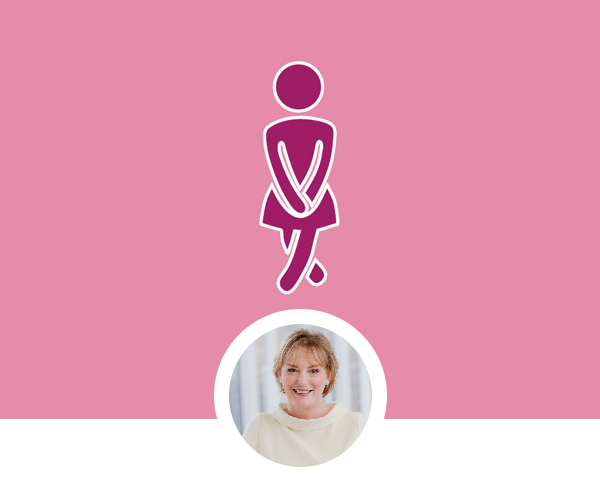Pelvic Floor Health

Below I am giving a very brief overview of pelvic floor health during the menopause. If one or all of these things are happening to you please do something about it or seek help as most problems are very curable or certainly better managed.
I have said for years that I should ask everyone who comes to see me to put £1 in a charity box when they start a sentence with, ‘Well, I had children in my thirties and everything has been fine, apart from the occasional leak with a bad cough – that’s normal, isn’t it? Now I am 52 and things are much worse: I can’t get to the toilet in time and I have a horrible heavy feeling in my vagina like everything is going to fall out.’ I would have raised a lot of money for charity over the years.
Stress Incontinence
The muscles of the pelvic floor support the bladder and keep us dry. Stress incontinence happens when these muscles become weak and the neck of your bladder does not always stay closed under stress, for example with a sneeze or a cough, which then leads to urine leaks. Stress incontinence commonly occurs after childbirth or during the menopause but it can also occur if you have had gynaecological surgery, for example a hysterectomy
Research indicates that between 25 and 45 per cent of women around the world suffer from stress incontinence although, it should be noted, these are just the women who are willing to admit it. The large statistical variance is almost certainly due to many people being too embarrassed to be completely honest about their symptoms. Imagine if you were asked if you had any symptoms of incontinence and perhaps occasionally you do (maybe just when you sneeze) – what would you say? I hope that after reading this you will feel empowered to proudly say, yes, I have and I am doing something about it.
You may have had a bit of stress incontinence over the last twenty or so years but if it wasn’t bad enough to be wearing a pad I suspect you never got around to doing anything about it. Suddenly it’s the menopause and things are much worse
How many times have you seen a menopausal woman on a trampoline? Something I hear all the time is: ‘I will never get on my granddaughter’s trampoline again! I was shocked to find I had wet my pants. Help!’ The trampoline and the skipping rope, for that matter, can be the ultimate bladder challenges.
Frequency, Urgency and Urge Incontinence
The symptoms of frequency and urgency can be harder to deal with when your oestrogen levels are starting to drop, but don’t panic; there are still things you can do to improve the situation. Due to the decrease in your oestrogen levels you can suddenly start having to run to the toilet. It might be after that double macchiato that you knew was a bad idea; it could be the sight of your front door at the end of a long busy day triggers an urgent need to pee, causing you to wince, cross your legs or hop up and down while you find your keys. You tell yourself it’s ridiculous, you only went an hour ago. But your bladder is having none of it and if you don’t get into the house fast disaster will strike.
Pelvic Organ Prolapse
It is thought that about 50 per cent of women over fifty have some degree or symptoms of prolapse. It may feel like a heavy feeling in your vagina, like you are sitting on an egg or a ball or a general feeling that ‘things’ are falling out.
Atrophic Vaginitis and Vaginal Dryness
Atrophic vaginitis means that the walls of your vagina start to thin and lose some of their elasticity. It can be accompanied by vaginal dryness, pain during sex, urinary infections and itching and soreness of the vulva. This is due to your body having less oestrogen.
All women can suffer from atrophic vaginitis. However, we are too often embarrassed to visit our doctor because things are not right ‘down there’. Often we don’t know why this is; we just know that sex is now super painful – often for days afterwards. This problem can often be solved or helped by the use of vaginal oestrogen and pelvic floor rehabilitation.
Quick Tips for Great Pelvic Floor Muscles:
We should all be doing pelvic floor exercises. It’s an absolutely vital part of our physical wellbeing, and is incredibly easy to do
Sit on the arm of a chair, or any hard surface with your feet flat on the floor. Lean slightly forward with your vulval area in contact with the hard surface. With your hands on your thighs try to lift the area around your vagina and anus away from whatever it is you are sitting on.
Draw up all the muscles at the same time, squeeze, lift and hold for a count of five – build up to ten over time, if you can. Let go gently and count to five, then repeat five times. Try to do the exercises three times a day at least twice maybe while cleaning your teeth then you will never forget. Once a day, do ten short, sharp contractions. Done in a rhythmic pattern of squeeze, let go, squeeze, let go.
If this is not working please don’t give up whatever you do you may be helped by a tool or gadget. For example vaginal weights, the Elvie trainer, or electrical stimulation (checking first with the manufactures instructions that these are ok for you to use) If in doubt seek help from a women’s health physiotherapist or a continence specialist. I wish you all much stronger pelvic floor muscles. Keep squeezing!

Jane Simpson grew up in rural North Yorkshire. She then trained as a nurse at Addenbrooke’s Hospital, Cambridge, in the 1980s. Becoming a Registered General Nurse.She went on to become a district nursing sister and while visiting her patients, her passion for urinary and pelvic floor problems began. She soon became a Continence Nurse Specialist in the NHS. For the last 22 years Jane has had her own private practice at the London Clinic in Harley Street, where she treats men and women, young and old, with all forms of incontinence and pelvic floor dysfunction. For example stress incontinence, overactive bladder and urge incontinence, pelvic organ prolapse, constipation and aspects of the menopause and childbirth relating to the pelvic floor.
She is planning to start a pelvic floor revolution! She is very keen to spread the word on a global scale that pelvic floor dysfunction is very curable and does not need to be life changing or life limiting.
Jane is happily married with a wonderful stepson; she is a passionate cook and keen gardener.